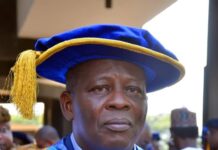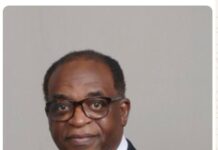By Owei Lakemfa
Two overriding ironies marked the Thirty Third Summit of African leaders held this week from February 9-10 with the theme: “Silencing the Guns: Creating Conducive Conditions for Africa’s Development.”
The first is that its Chairperson, President Abdel Fattah el-Sisi of Egypt was a serving general who contrary to the African Union (AU) rules, overthrew a democratically elected government, and has through a charade, imposed himself as the ‘elected’ president of a country that lies prostrate under military jackboots. Seven years after his coup, and about six years after his June 8, 2014 proclamation as president, Sisi continues to rule without regard for basic human rights, employing the use of torture and procuring the death sentence for his opponents through a conquered judiciary.
Africa in the last few years has been working on its Vision 2020 which is to ‘Silence the Gun’ by this year. But how could the continent achieve this goal when its last two chairpersons, President Paul Kagame of Rwanda and Sisi run basically authoritarian governments? How are we to silence the guns when Chairman Sisi is a product of the gun?
This irony was not lost on the AU whose Commission Chairman, Moussa Faki Mahamat during his November, 2019 visit to South Africa, told Sisi’s designated successor as AU chair, President Cyril Ramaphosa that he hopes the new leadership will: “take us a step further in the implementation of our programmes (as) we can’t silence the guns without good governance, without justice, and without equality” Fittingly, Ramaphosa, a noted democratic figure on the continent is now the new chairman.
The second major irony is Nigeria, the continent’s most populous country and acclaimed giant which after indefinitely shutting its borders against fifteen African countries, asked Africa to vote it as head of the Africa Continental Free Trade Area (ACFTA) a body that is about open borders and free movement of goods and persons. How can a country which for four months now has shut its borders with no timeline for reopening, aspire to lead free trade in the continent?
Nigeria had tried to reach out to the rest of the continent in December by announcing a visa on arrival policy for Africans. But that seemed too little too late as this has been the Rwandan policy for some years now and countries like Kenya and Ethiopia had also evolved this policy. It is ironic that a country that claims to be opening its skies to all of Africa, has its land borders closed.
Despite the clear opposition by most countries at this week’s AU Summit, and the emergence of South Africa as the ACFTA consensus candidate, Nigeria insisted on throwing its weight around, forcing the AU to go into voting.
Nigeria had signed the ACFTA pact in July, 2019. But it was too late to campaign that its headquarters be cited in Nigeria; Ghana had earlier lobbied and was given the honour to host the continental body. However, Nigeria decided to head the body and threw its hat into the ring.
There were 121 applicants for the post which was narrowed down to six candidates, then three. They were from Nigeria, South Africa and the Democratic Republic of Congo (DRC)
The Nigerian candidate was Cecilia Akintomide, Board Member of FBN Holdings Plc and eTranzact International Ltd, former Junior Associate at Thomas O & Co., Associate for Weil, Gotshal & Manges LLP and ex- Vice President at the African Development Bank. This was in sharp contrast to Ms. Fatima Kyari Mohammed the candidate the country had presented at the 2017 AU Summit for the leadership of the Peace and Security Commission, who had a near zero work or service experience.
South Africa presented Wamkele Mene, 42, a former Chief Director of Africa Economic Relations at its Department of Trade & Industry, former Chairman, Committee on International Trade in Financial Services, World Trade Organization (WTO) and its Chief ACFTA Negotiator. The DRC presented Faustin Luanga, former Economic Adviser to ex-President Joseph Kabila.
The AU Commission had empowered the continent’s Trade Ministers to conduct a competency-based selection process in which Mene came first, Luanga second and Akintomide, third. South Africa also had an advantage; while it had ratified ACFTA, Nigeria and the DRC had not.
But Nigeria refused to concede, and for three days, the Nigeria-South Africa rivalry was reignited at the Summit. The DRC saw the battle between the two largest economies in Africa as an opportunity to present itself as a compromise candidate, and so decided not to step down. Nigerian supporters played the gender card arguing that the AU campaigns for women empowerment while those of South Africa argued that since Ghana is going to host the ACFTA Secretariat, the Secretary General should not come from the same West African Region.
To ease tension and avoid a vote, it was suggested that South African President Cyril Ramaphosa, Nigerian President Muhammadu Buhari and Congolese President Félix Antoine Tshisekedi should meet and reach a consensus. This did not happen, so the only option left was for African leaders to vote.
The winning candidate required endorsement by 33 of the 55 AU-Member countries. In the first vote, Mene got 25, Akintomide 15 and Luanga six. The next round was 27-13-4. In the third round, it was 27-15-3 and Luanga withdrew. Akintonde stayed, garnering 17 votes to Mene’s 28 in the fourth round.
Nigeria refused to back down, so a fifth round of voting commenced with Mene scoring 28 votes to 16. Yet Nigeria persisted leading to Mene scoring 28 votes to Akintonde’s 15. At this point, Nigeria withdrew leaving Mene as the sole candidate in the seventh round of voting in which he had 35 votes, with nine abstentions.
I have participated in a number of international conferences including AU Summits, and I think Nigeria should have been able to analyze that the African Trade Ministers selection process in which its candidate came third out of three candidates, was like a consensus. So, it should not have forced a vote. However, having insisted on a vote, the results of the third round should have dictated a withdrawal like the DRC did.
The politics leading to the Summit and the bruising campaigns over the ACFTA leadership which began on Friday February 7 might have rubbed off on the AU succession process. The South African group had accused President Buhari of conducting a political battle on ACFTA where the requirement is technical. At a closed door meeting of the Heads of State, DRC’s Félix Tshisekedi was elected First Vice Chairperson of the AU which means he would be the Chairperson for 2021. Nigeria may be the big brother in Africa, but in the continent’s politics, it is playing like a toddler.



